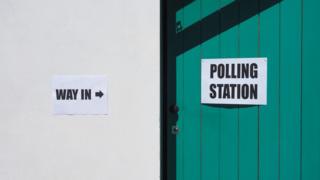[ad_1]

Image copyright
Getty Images
Parliament has broken up and the election campaign is under way. But what does that mean and how is it organised?
Here are our answers to just some of the questions we have received from readers.
Is the number of MPs stepping down at this election higher than usual? – Louise Gregory
The number of MPs who decide to retire or stand down from Parliament before a general election varies widely.
By Tuesday evening, 66 MPs had indicated that they will not be seeking re-election this time.
This compares to an average of just under 86 MPs who stood down at 10 previous general elections, beginning in 1979.
Do MPs still get paid during the election period, and do they have to do any work? – Andrew, Pudsey
MPs are no longer MPs once Parliament is dissolved. They are ordinary members of the public with no special privileges. That is because every seat in the House of Commons is now up for grabs.
However, they continue to receive their salary, currently £79,468 a year, up to and including polling day. If they have chaired a select committee, the extra payment they get for doing that job stops on the day Parliament is dissolved.
They are under no obligation to do any work during this period and their parliamentary passes are locked out. But they can keep abreast of urgent casework via parliamentary email.
Our question-askers (clockwise from top left):, Andrew Burgess, Alastair Somerville, Louise Gregory and Kate Siddall
When do we find out who our local candidates will be? How long does it take to select a new candidate? Gavin, Gerrards Cross.
The deadline for all candidates to apply, whether attached to a party or independent, is 14 November.
Different parties have different methods of choosing candidates. In essence, they are drawn from a centrally-approved candidates’ list, with the final decision made by local party members.
The time taken to select a candidate varies but, if time is short, the national bodies of the main political parties can impose a candidate on a constituency party.
What restrictions are there on candidates standing for election? – Pete, Runcorn
According to the Electoral Commission, all candidates must be at least 18 years old on the day they are nominated, and must be a British, Irish or eligible Commonwealth citizen.
A wide range of people are not allowed to stand because their job or role is seen as being incompatible with being an MP. These include members of the House of Lords, civil servants, military personnel and judges. Members of the European Parliament cannot stand for the Westminster parliament and no-one can stand in more than one constituency.
Prisoners serving a custodial sentence after conviction cannot vote in any elections. The same applies to some people who are subject to bankruptcy orders or proceedings, although bankruptcy in itself is not a disqualification.
Image copyright
Getty Images
Judges are barred from standing at general elections
How much does it cost to stage a general election? – Francis Klonowski
The 2017 election cost taxpayers £140m. Seventy-five parties and 15 campaign groups reported spending £41.6m between them.
The general election explained
How much does a returning officer get paid? – Kate, Leeds
A returning officer – who is ultimately responsible for the election for the entire constituency or constituencies they are appointed to – earned between £2,500 and £4,343 in 2017. Their fees are set by the government. A presiding officer, responsible for the polling station throughout the day, is paid between £200 and £300.
Can a suspended MP stand for re-election in a general election? – R Allen
An MP suspended by the Commons can stand in any by-election or general election.
But this would probably have to be as an independent candidate, because they would almost certainly lose the party whip. However, in theory there is nothing stopping a party choosing them as the candidate.
If the MP has yet to serve the suspension before an election it rolls over to the next parliamentary session, assuming they win the election.
Why can’t the electoral process be brought into the 21st Century and have online voting? – David Zech
Image copyright
Getty Images
The UK still votes and counts votes by hand, unlike Estonia, where internet voting is allowed in parliamentary elections
In 2007 Estonia became the first, and so far only, country to introduce the option of internet voting for parliamentary elections. At its 2019 general election, 43.8% of voters there used this option.
As regards the UK, in 2015, the Speaker’s Commission on Digital Democracy, made up of MPs and others from a “range of relevant professions and backgrounds”, recommended that “by 2020, secure online voting should be an option for all voters”.
However, parliamentary legislation has not yet been proposed, with the question of security being cited as one reason this system has not been adopted.
Will Brexit negotiations continue during the pre-election period? – Alastair Somerville
No. The UK government and EU have an agreement for the terms of departure and so there is nothing new to negotiate during the run-up to the election. And trade talks can only start after the UK has left.
What question do you have about the general election?
In some cases your question will be published, displaying your name and location as you provide it, unless you state otherwise. Your contact details will never be published. Please ensure you have read the terms and conditions.
Use this form to ask your question:
[ad_2]
Source link

